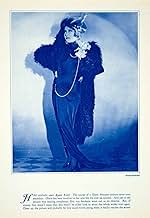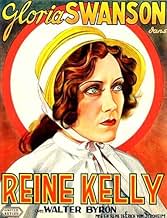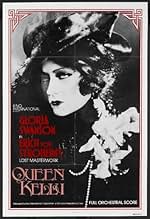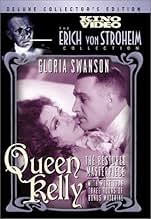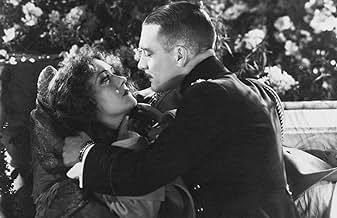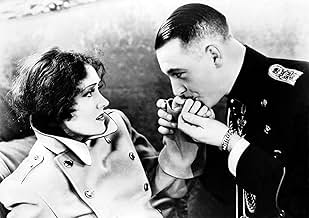CALIFICACIÓN DE IMDb
7.1/10
3.4 k
TU CALIFICACIÓN
Agrega una trama en tu idiomaA convent girl is abducted and seduced by a prince before being sent off to a brothel in East Africa.A convent girl is abducted and seduced by a prince before being sent off to a brothel in East Africa.A convent girl is abducted and seduced by a prince before being sent off to a brothel in East Africa.
- Dirección
- Guionistas
- Elenco
- Premios
- 1 premio ganado en total
Sylvia Ashton
- Kelly's Aunt
- (sin créditos)
Wilson Benge
- Prince Wolfram's Valet
- (sin créditos)
Sidney Bracey
- Prince Wolfram's Lackey
- (sin créditos)
Rae Daggett
- Coughdrops
- (sin créditos)
Robert Frazier
- Catholic Priest
- (sin créditos)
Florence Gibson
- Kelly's Aunt
- (sin créditos)
Madge Hunt
- Mother Superior
- (sin créditos)
Tully Marshall
- Jan Vryheid
- (sin créditos)
Ann Morgan
- Maid Escorting Kelly to Altar
- (sin créditos)
Madame Sul-Te-Wan
- Kali Sana - Aunt's Cook
- (sin créditos)
Lucille Van Lent
- Prince Wolfram's Maid
- (sin créditos)
Wilhelm von Brincken
- Prince Wolfram's Adjutant
- (sin créditos)
Gordon Westcott
- Lackey
- (sin créditos)
- Dirección
- Guionistas
- Todo el elenco y el equipo
- Producción, taquilla y más en IMDbPro
Opiniones destacadas
The restored version of "Queen Kelly' shown on TCM recently was a revelation to those of us who only knew Gloria Swanson from "Sunset Boulevard" in the '50's. Swanson in 1928 had incredibly large and luminous (?green?) eyes, as well as that curiously angular lower jaw still evident in "Boulevard". She seemed fairly tall and almost husky in "Kelly", compared to many women (and men) of the 20's to the 50's who were physically quite small, and looked it in their screen roles. She was lovely in a unique way.
More importantly, I thought Swanson was GREAT in the part. What an incredible range of facial and body expressiveness! Given the restrictions of the plot, and doubtless a domineering director, Swanson did a tremendous job in making her character seem believable. Yes, perhaps she did look older than 18, but in my opinion, she could pass for 21 or so. She certainly didn't look older than her 31 years, as another reviewer opines. Perhaps her sheer acting skill and range of motion were convincing enough to play 10 years younger than her true age. It's done all the time on the stage and screen, why wouldn't it be acceptable in this 1928 film?
I found Walter Byron gorgeous, and strangely modern in his good looks. Not of the now-hackneyed strong-profile leading man variety popular in early films. Instead, he was impeccably groomed and costumed, with short, straight, slicked-back hair. A beautiful sight to behold. He did a very good job within the constraints of silent acting. I'll be looking for more of his work.
The Jan VanHeidt character was almost too-disgusting to be credible, but archetypes were more pronounced in the silent genre. The actor did a very credible job, doubtless under the director's specific instructions about how to convey his debauched and depraved condition.
Perhaps it's because so much of the film was lost and/or cut, but Kelly's acquiescence to marrying the dissolute Jan seemed inexplicable to me. Von Stoheim went to a lot of trouble to give Swanson a L-O-N-G flashback while the wedding ceremony was being read which included the Prince's admonition to Kelly not to "forget him", "forsake him", or words to that effect. Yet she says yes anyway. You have to make a lot of assumptions about Kelly's character and personality to justify her decision, and rationalize in your own mind why on earth she didn't manifest some gumption and say after due consternation and anguish, "No, No, Never!".
This is a technically beautiful film. The lighting, sets, costumes, etc. are wonderful! Well worth seeing, even with the missing film and downbeat ending.
More importantly, I thought Swanson was GREAT in the part. What an incredible range of facial and body expressiveness! Given the restrictions of the plot, and doubtless a domineering director, Swanson did a tremendous job in making her character seem believable. Yes, perhaps she did look older than 18, but in my opinion, she could pass for 21 or so. She certainly didn't look older than her 31 years, as another reviewer opines. Perhaps her sheer acting skill and range of motion were convincing enough to play 10 years younger than her true age. It's done all the time on the stage and screen, why wouldn't it be acceptable in this 1928 film?
I found Walter Byron gorgeous, and strangely modern in his good looks. Not of the now-hackneyed strong-profile leading man variety popular in early films. Instead, he was impeccably groomed and costumed, with short, straight, slicked-back hair. A beautiful sight to behold. He did a very good job within the constraints of silent acting. I'll be looking for more of his work.
The Jan VanHeidt character was almost too-disgusting to be credible, but archetypes were more pronounced in the silent genre. The actor did a very credible job, doubtless under the director's specific instructions about how to convey his debauched and depraved condition.
Perhaps it's because so much of the film was lost and/or cut, but Kelly's acquiescence to marrying the dissolute Jan seemed inexplicable to me. Von Stoheim went to a lot of trouble to give Swanson a L-O-N-G flashback while the wedding ceremony was being read which included the Prince's admonition to Kelly not to "forget him", "forsake him", or words to that effect. Yet she says yes anyway. You have to make a lot of assumptions about Kelly's character and personality to justify her decision, and rationalize in your own mind why on earth she didn't manifest some gumption and say after due consternation and anguish, "No, No, Never!".
This is a technically beautiful film. The lighting, sets, costumes, etc. are wonderful! Well worth seeing, even with the missing film and downbeat ending.
In an ancient European kingdom, sultry Seena Owen (as Queen Regina V) lounges, awaiting her nuptials with dashing Walter Byron (as Prince Wolfram). Nearby, convent girl Gloria Swanson (as Patricia Kelly) encourages the Lord's wrath by sleeping with her photographs of the handsome Mr. Byron. While he is out riding one day, Ms. Swanson gets a chance to meet the idolized Prince, and embarrassingly loses her knickers! For Swanson and Byron, it's love at first sight. But, how can a simple convent girl get the Queen's stud?
Director Erich von Stroheim and actress Gloria Swanson, with their skills in full tilt excess, are a joy to behold. Yet, "Queen Kelly" emerges as a fairly strong film, despite its self-indulgence. Once considered a hopelessly unfinished work; the film has been restored, with great integrity, through intertitles, stills, and imagination. There is no doubt Swanson would have played the final reels expertly; but, there is no way to tell if Stroheim and Swanson would have re-shot some of her opening footage. Few convent girls looked as gorgeous as Gloria Swanson, with her amplified eyelashes. Though she isn't the first (or last) Hollywood convent inhabitant to look so ravishing, it would have been wise to tone down the look, until later in the film.
Flaws notwithstanding, "Queen Kelly" is full of great stuff. Tobacco-stained Tully Marshall (as Jan Vryheid) and whip-wielding Ms. Owen are delightfully outrageous. Byron, pocketing her knickers, is a thoroughly charming partner for Swanson. Stroheim, and photographers Gordon Pollock and Paul Ivano, are outstanding; a simple scene of Swanson praying, with candles dripping around her, is beautiful.
Ah, they had faces then
Director Erich von Stroheim and actress Gloria Swanson, with their skills in full tilt excess, are a joy to behold. Yet, "Queen Kelly" emerges as a fairly strong film, despite its self-indulgence. Once considered a hopelessly unfinished work; the film has been restored, with great integrity, through intertitles, stills, and imagination. There is no doubt Swanson would have played the final reels expertly; but, there is no way to tell if Stroheim and Swanson would have re-shot some of her opening footage. Few convent girls looked as gorgeous as Gloria Swanson, with her amplified eyelashes. Though she isn't the first (or last) Hollywood convent inhabitant to look so ravishing, it would have been wise to tone down the look, until later in the film.
Flaws notwithstanding, "Queen Kelly" is full of great stuff. Tobacco-stained Tully Marshall (as Jan Vryheid) and whip-wielding Ms. Owen are delightfully outrageous. Byron, pocketing her knickers, is a thoroughly charming partner for Swanson. Stroheim, and photographers Gordon Pollock and Paul Ivano, are outstanding; a simple scene of Swanson praying, with candles dripping around her, is beautiful.
Ah, they had faces then
My favorite Von Stroheim bio says the thing that killed this film is that it was begun smack in the middle of the industry-wide transition to sound. Swanson hired Von Stroheim for her independent producing company because she thought him the greatest director working at the time. The work continued on the film for a period under this condition: Behind the scenes, and unbeknownst to Von Stroheim, financier Joseph Kennedy and Gloria Swanson, concerned about the state of the market into which this film would be released eventually, started discussing ways to bail out the project vis a vis sound vs. silent film. They discussed adding a sound track, basically a music and effects track, after the fact; one plan was to film and insert some singing sequences to a basically silent film as The Jazz Singer had. In the end, it is supposedly Kennedy who nixed the whole thing saying no use throwing good money after bad.
Von Stroheim was troubled by this turn of events, but he didn't hate Swanson over it. Still, he did not see her or speak to her for another 21 years, and then only during the filming of Sunset Boulevard. (He despised this, probably his most high profile film role: "That damned butler role" he supposedly called it to the end of his days. He saw it as a crude burlesque, for an ignorant new generation, of a great silent director-- who just happened to be none other than Erich Von Stroheim.)
Queen Kelly shows modern viewers just how sophisticated the last silent films were visually. It is astonishing the fluid, second-nature communication that took place entirely without words. Title cards had become largely superfluous, a throwback to an earlier style of storytelling. And sound, rather than, as has so often been declared, selling out the developments in silent films, seems a natural outgrowth of these last silent years.
Von Stroheim was troubled by this turn of events, but he didn't hate Swanson over it. Still, he did not see her or speak to her for another 21 years, and then only during the filming of Sunset Boulevard. (He despised this, probably his most high profile film role: "That damned butler role" he supposedly called it to the end of his days. He saw it as a crude burlesque, for an ignorant new generation, of a great silent director-- who just happened to be none other than Erich Von Stroheim.)
Queen Kelly shows modern viewers just how sophisticated the last silent films were visually. It is astonishing the fluid, second-nature communication that took place entirely without words. Title cards had become largely superfluous, a throwback to an earlier style of storytelling. And sound, rather than, as has so often been declared, selling out the developments in silent films, seems a natural outgrowth of these last silent years.
I'd imagine that most people who would come to this page to read a review of Erich Von Stroheim's unfinished epic Queen Kelly already know something about it, but nonetheless it seems a little historical context is necessary before attempting to critique the fragment that remains. This was a deeply troubled project, memorably described by leading lady Gloria Swanson as a child that refused to be born. Set in a fictitious 'Middle European' kingdom, the first portion of Von Stroheim's screenplay tells a fairy tale-like story of an innocent convent girl, Patricia Kelly, who becomes involved with a wastrel Prince-- who, unbeknownst to her, is already betrothed to the Queen. At first the Prince wants only to toy with Kelly, but in the course of their one evening together he sincerely falls in love with her. Unfortunately, the mad Queen Regina learns of the affair and literally flogs Kelly out of the palace. Kelly attempts suicide, but is rescued and abruptly sent to German East Africa, where her dying aunt runs a brothel. She is forced to marry a syphilitic plantation owner and eventually winds up successfully running the brothel herself, under the ironic moniker "Queen Kelly."
As originally scripted this film might have run as long as five hours, so the portion available today represents barely one-third of the intended opus. The project marked the sole collaboration between writer/director Von Stroheim, star/producer Swanson, and co-producer Joseph P. Kennedy, patriarch of the political dynasty (who was also Swanson's lover at the time). Plans for this silent epic were launched at the end of 1927, but by the time shooting began in fall of 1928 the talkie revolution was sweeping Hollywood, and this would prove to be perhaps the biggest single factor that doomed the project to limbo. Three months into the filming Von Stroheim was fired, and for the next few years Swanson attempted to finish the movie in various ways, finally releasing a truncated version in Europe in 1932. In the 1960s about twenty minutes' worth of footage from the sequence set in Africa was discovered, and this material was reunited with the earlier portion in a restored version completed in 1985.
Given this history it seems almost unfair to critique what remains of Queen Kelly at all, but the restoration presents a rough idea of what the movie might have amounted to in its longer form. This is a fascinating fragment with both positive and negative aspects.
On the positive side, the film is beautiful to look at; Paul Ivano's gleaming cinematography ranks with the best work of the era. Practically every shot boasts features of striking interest, and the production design teems with the sort of character-revealing detail for which Von Stroheim was known. Befitting the unreal atmosphere, Seena Owen and Tully Marshall offer highly stylized character turns as Queen Regina and plantation owner Jan Vryheid. Owen's Mad Queen is unforgettable, lounging about the palace nude (while toting a strategically positioned white cat!), surrounded by erotic art and brandishing a riding crop. Marshall's scenes are limited to a few minutes in the recovered 'Africa' footage, but he etches a vivid portrait of creepy decadence.
On the debit side, however, is the central and insurmountable problem that Gloria Swanson was miscast in the title role: she simply isn't credible as the innocent convent girl the story demands. Kelly is supposed to be a sheltered girl who has never tasted champagne. Swanson was 31 years old when this film was made and, frankly, looked older. Even in films she made in her early 20s she comes off as a tough cookie who could handle anything, but here, alongside the actual girls who are supposed to be her contemporaries, Gloria looks like she should be playing the Mother Superior. Von Stroheim's leading lady from The Wedding March, 21 year-old Fay Wray, would have been perfect as Kelly, but once producer Swanson cast herself in the role the project was inherently flawed.
Another problem is that most of this material was edited together only after Von Stroheim had been fired and the production shut down, when Swanson was attempting to assemble a marketable feature-length movie out of the opening 'Middle Europe' section. Originally these scenes had been intended to serve as little more than a prologue to the Africa story, but since it was the only portion completed the editors were forced to extend what they had to pad the running time. There is much lingering over details and too many prolonged reaction shots, especially in the scenes between Kelly and the Prince. It's said that when Erich Von Stroheim saw this version of the film in later years he complained that the pace was far too slow, and so it appears today: sumptuously photographed but draggy, despite the occasional high points.
In sum, while I would call this film a must for silent movie buffs, I don't believe the average viewer would find much to enjoy in Queen Kelly. This is one of those legendary disasters with a "backstory" rather more interesting than what we see on screen. In that light I can especially recommend watching the recent DVD release with film scholar Richard Koszarski's commentary accompanying the visuals, to help make sense of it all.
As originally scripted this film might have run as long as five hours, so the portion available today represents barely one-third of the intended opus. The project marked the sole collaboration between writer/director Von Stroheim, star/producer Swanson, and co-producer Joseph P. Kennedy, patriarch of the political dynasty (who was also Swanson's lover at the time). Plans for this silent epic were launched at the end of 1927, but by the time shooting began in fall of 1928 the talkie revolution was sweeping Hollywood, and this would prove to be perhaps the biggest single factor that doomed the project to limbo. Three months into the filming Von Stroheim was fired, and for the next few years Swanson attempted to finish the movie in various ways, finally releasing a truncated version in Europe in 1932. In the 1960s about twenty minutes' worth of footage from the sequence set in Africa was discovered, and this material was reunited with the earlier portion in a restored version completed in 1985.
Given this history it seems almost unfair to critique what remains of Queen Kelly at all, but the restoration presents a rough idea of what the movie might have amounted to in its longer form. This is a fascinating fragment with both positive and negative aspects.
On the positive side, the film is beautiful to look at; Paul Ivano's gleaming cinematography ranks with the best work of the era. Practically every shot boasts features of striking interest, and the production design teems with the sort of character-revealing detail for which Von Stroheim was known. Befitting the unreal atmosphere, Seena Owen and Tully Marshall offer highly stylized character turns as Queen Regina and plantation owner Jan Vryheid. Owen's Mad Queen is unforgettable, lounging about the palace nude (while toting a strategically positioned white cat!), surrounded by erotic art and brandishing a riding crop. Marshall's scenes are limited to a few minutes in the recovered 'Africa' footage, but he etches a vivid portrait of creepy decadence.
On the debit side, however, is the central and insurmountable problem that Gloria Swanson was miscast in the title role: she simply isn't credible as the innocent convent girl the story demands. Kelly is supposed to be a sheltered girl who has never tasted champagne. Swanson was 31 years old when this film was made and, frankly, looked older. Even in films she made in her early 20s she comes off as a tough cookie who could handle anything, but here, alongside the actual girls who are supposed to be her contemporaries, Gloria looks like she should be playing the Mother Superior. Von Stroheim's leading lady from The Wedding March, 21 year-old Fay Wray, would have been perfect as Kelly, but once producer Swanson cast herself in the role the project was inherently flawed.
Another problem is that most of this material was edited together only after Von Stroheim had been fired and the production shut down, when Swanson was attempting to assemble a marketable feature-length movie out of the opening 'Middle Europe' section. Originally these scenes had been intended to serve as little more than a prologue to the Africa story, but since it was the only portion completed the editors were forced to extend what they had to pad the running time. There is much lingering over details and too many prolonged reaction shots, especially in the scenes between Kelly and the Prince. It's said that when Erich Von Stroheim saw this version of the film in later years he complained that the pace was far too slow, and so it appears today: sumptuously photographed but draggy, despite the occasional high points.
In sum, while I would call this film a must for silent movie buffs, I don't believe the average viewer would find much to enjoy in Queen Kelly. This is one of those legendary disasters with a "backstory" rather more interesting than what we see on screen. In that light I can especially recommend watching the recent DVD release with film scholar Richard Koszarski's commentary accompanying the visuals, to help make sense of it all.
I am going to address the Kino DVD of Queen Kelly because that is how I saw the film (which is probably true of most of the film's North American viewers). Queen Kelly is never going to resemble anything close to what its director Erich von Stroheim imagined. Therefore, any version is a compromise. There are two options as releases go. An abbreviated version of what was filmed of the script was released with a hasty ending shot at the request of star Gloria Swanson. This version is called the Swanson cut. The second version is a restoration that includes all of the extant footage that was filmed (some materials having been lost). To fill in gaps, this release uses still photos and a scrawl at the end to inform viewers what was supposed to have happened had the production continued. Kino decided to release the film on DVD using the restoration while having the Swanson ending as an extra. I feel that this was a mistake, and Kino should have either released both versions of the film on the DVD (preferrably) or released the Swanson cut and had the found von Stroheim footage as an extra on the DVD.
The Swanson cut is a good movie, with a weak ending. However, it does a work as a movie, if a somewhat stunted one. There is a beginning (lovers meet), a middle (lovers spend an enchanted night together), and a quick ending. Along the way, the film conjures some wonderful scenes: Queen Regina with her cat descending upon Prince Wolfram and his dog, Kelly meeting the Prince and losing a piece of clothing, Kelly in the church sanctuary bathed in candlelight, and the climatic meeting between Kelly and the Queen.
By contrast, the restoration is problematic because it fails to go anywhere. There is a beginning, the start of a middle, and then a bunch of scenes, great masterful scenes, but scenes that do not pay off. Then the film ends with an epilogue explaining what the viewer might have seen had the film finished shooting and had then been edited and released the way von Stroheim intended (not a guarantee considering what happened with Greed which was all filmed).
I can appreciate Kino's dilemma. The found, unused scenes from the film feature some of the most astounding visuals and drama of any American silent film. The brothel setting oozes ornamental decadence. Film fans owe a lot to whomever preserved these scenes. Yet, I don't think the restoration works as a self-contained film. The found footage plays like a fascinating twenty minute trailer for a grand epic that no one will ever get to see. By taking out Swanson's ending and putting in this footage, the restorers end with an unfinished film and a frustrating viewing experience.
I happened to be reading Andrew Sarris's The Primal Screen during the same period I watched Queen Kelly. A quote stood out from that book which fit director von Stroheim.
"I think it is a mistake for critics to scold artists or event to bemoan their bad luck . . . . It is better to accept and appreciate the supposed 'disappointments' of our time - Welles, Mailer, Salinger - for what they have done rather than for what they might have done if we had been able to crack the whip over them. They have all done as much as they were humanly capable of doing, and so did Fitzgerald, Hemingway, and Dos Passos before them, and thank God for The Great Gatsby, The Sun Also Rises and U.S.A. and never mind the rude avoidance of encores."
Yes, thank God for any version of Greed and Queen Kelly, even if I do believe that the restorations of both films are less satisfying for viewers than the original, theatrical cuts.
The Swanson cut is a good movie, with a weak ending. However, it does a work as a movie, if a somewhat stunted one. There is a beginning (lovers meet), a middle (lovers spend an enchanted night together), and a quick ending. Along the way, the film conjures some wonderful scenes: Queen Regina with her cat descending upon Prince Wolfram and his dog, Kelly meeting the Prince and losing a piece of clothing, Kelly in the church sanctuary bathed in candlelight, and the climatic meeting between Kelly and the Queen.
By contrast, the restoration is problematic because it fails to go anywhere. There is a beginning, the start of a middle, and then a bunch of scenes, great masterful scenes, but scenes that do not pay off. Then the film ends with an epilogue explaining what the viewer might have seen had the film finished shooting and had then been edited and released the way von Stroheim intended (not a guarantee considering what happened with Greed which was all filmed).
I can appreciate Kino's dilemma. The found, unused scenes from the film feature some of the most astounding visuals and drama of any American silent film. The brothel setting oozes ornamental decadence. Film fans owe a lot to whomever preserved these scenes. Yet, I don't think the restoration works as a self-contained film. The found footage plays like a fascinating twenty minute trailer for a grand epic that no one will ever get to see. By taking out Swanson's ending and putting in this footage, the restorers end with an unfinished film and a frustrating viewing experience.
I happened to be reading Andrew Sarris's The Primal Screen during the same period I watched Queen Kelly. A quote stood out from that book which fit director von Stroheim.
"I think it is a mistake for critics to scold artists or event to bemoan their bad luck . . . . It is better to accept and appreciate the supposed 'disappointments' of our time - Welles, Mailer, Salinger - for what they have done rather than for what they might have done if we had been able to crack the whip over them. They have all done as much as they were humanly capable of doing, and so did Fitzgerald, Hemingway, and Dos Passos before them, and thank God for The Great Gatsby, The Sun Also Rises and U.S.A. and never mind the rude avoidance of encores."
Yes, thank God for any version of Greed and Queen Kelly, even if I do believe that the restorations of both films are less satisfying for viewers than the original, theatrical cuts.
¿Sabías que…?
- TriviaA clip from the film appears in El ocaso de una vida (1950), where Norma Desmond (played by Gloria Swanson), a silent movie star who is planning a comeback, watches one of her former films. Erich von Stroheim plays Max Von Mayerling, Desmond's butler, who serves as projectionist for the film clip. It is later revealed that Max was the silent movie director who discovered Norma Desmond. Director Billy Wilder recalled that it was von Stroheim's idea to use the clip from Queen Kelly (1932) in El ocaso de una vida (1950), to add realism.
- ErroresThe positions of the two different groups, the troops and the convent girls, are constantly changing in relation to the shrine on Kambach road.
- Citas
[as Wolfram and Fritz are racing their horses down the street]
Girl 1: Come on, Wild Wolfram! I've bet my nightie on you!
Girl 2: Come on, Fritz! She hasn't GOT a nightie!
- Versiones alternativasDirector Erich von Stroheim never completed the film: the ending is made using stills and subtitles. The European version has a different storyline than the American one.
- ConexionesEdited from Queen Kelly: The Kino Restored International Ending (2011)
Selecciones populares
Inicia sesión para calificar y agrega a la lista de videos para obtener recomendaciones personalizadas
- How long is Queen Kelly?Con tecnología de Alexa
Detalles
Taquilla
- Presupuesto
- USD 800,000 (estimado)
- Tiempo de ejecución
- 1h 41min(101 min)
- Color
- Mezcla de sonido
- Relación de aspecto
- 1.33 : 1
Contribuir a esta página
Sugiere una edición o agrega el contenido que falta


